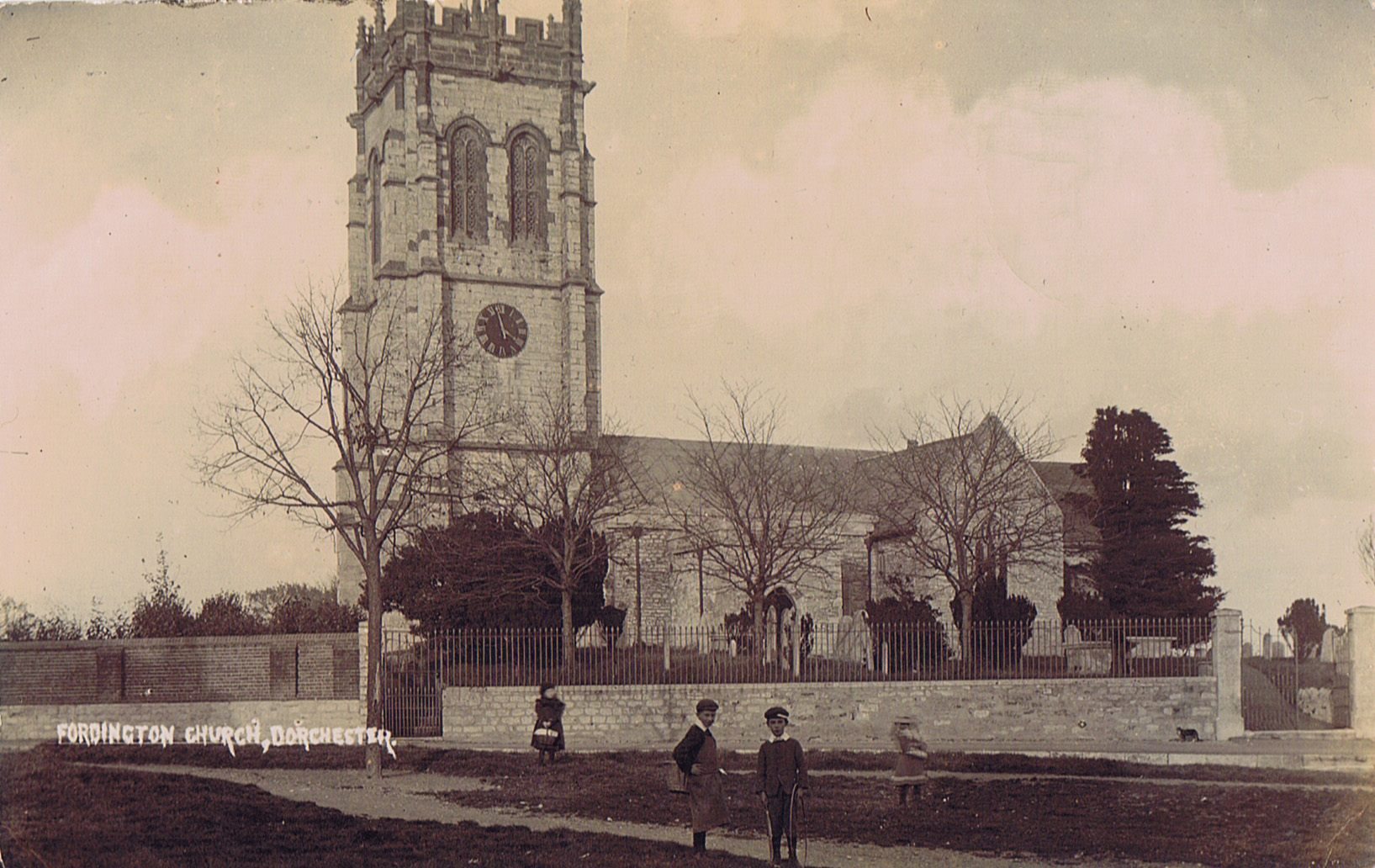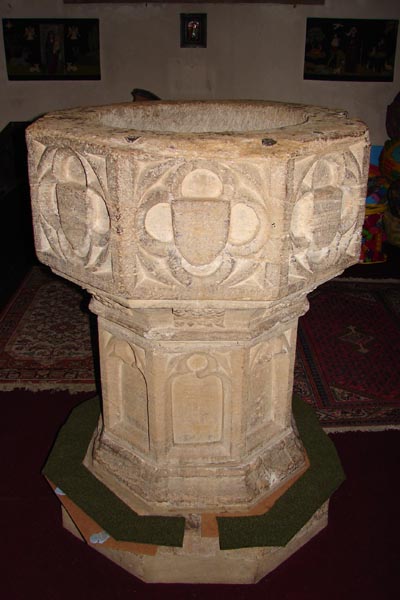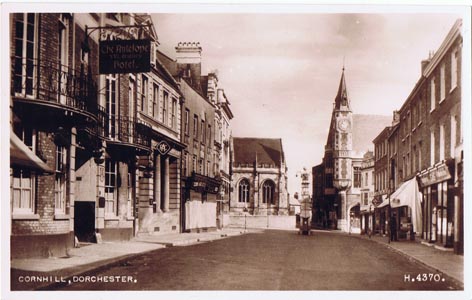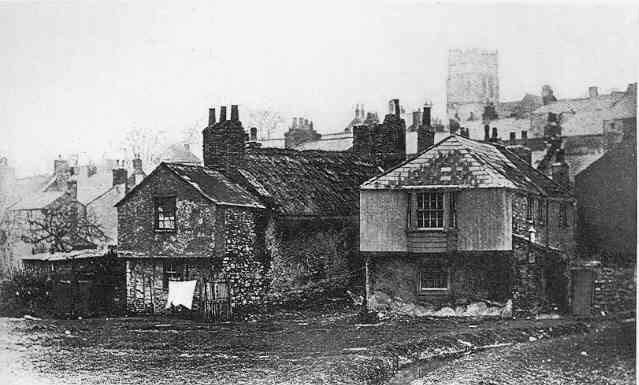Birth and Baptism 1746:
Early in the year of our Lord 1746, probably in late March or the 1st week of April, a small baby boy was abandoned in the parish of Fordington. The traditional place to abandon children (that you want to be found quickly that is! ) was the porch of the local parish church as it offered some protection against the prevailing weather - and it's often not good in April. If this was the case he would have been discovered by the vicar or perhaps the churchwarden when they arrived to open the church that morning. From the picture below you can see that the church was much smaller then but also more isolated so it would have been relatively easy to arrive unnoticed.

The church of St George - Fordington as it looked in the 18th Century
© Picture Copyright Michael Russell FIPD - Picture taken prior to 1905
The Vicar of St Georges Church then was the Rev John JACOB (1690-1759) who, on that fateful day, had already been vicar there for over 32 years. He was also rector of All Saints Church in Dorchester ever since the previous incumbent, the Rev Thomas Wyatt, had died in 1734. He moved with ease amongst the highest members the governing body in Dorchester operating at times as a Notary Public and preaching at the assizes and on public occasions. Although he was clearly an important member of the local community he was active in his Ministry moving with equal ease amongst the poor. He is likely to have known any local girls in trouble as many of them lived in the notorious 'Mill Street' within his parish and there are many examples of his recording the baptism of base born children in his parish register where the mothers name was always given.
No, this was clearly an unusual event and the boy's mother was much more likely to have been an itinerant worker who gave birth as she passed through the town, as Fordington sits on the old Roman road from Weymouth right at the junction of the roads to Exeter, Sherborne, Wareham and the busy route to London through Salisbury. As such there was no real chance of identifying her. The Churchwardens and Overseers of the Poor took him into the local workhouse, probably paying for a wet nurse and his upkeep until he was old enough to work which would have been from the age of 7. If John Jacob didn't actually find him, I am fairly sure he gave him his unusual Christian name of 'Fortunatus' which is Latin and has a number of connotations including 'Lucky', 'Blessed' and 'Fortune'. At this date and given he was being baptised I like to think the Vicar intended it to mean 'Blessed with good fortune by the Lord'. He also gave him the surname of 'FORDINGON' indicating where he was first found. None of the other people involved with the child during this time knew Latin whereas John Jacob had been educated at Merton College in Oxford and made a bachelor of Canon Law in 1714 so would have been fluent in Latin.

What we do know for certain is that John JACOB baptised the boy in the above font in St Georges Church giving him the name of Fortunatus FORDINGTON on 13th April 1746. The entry he made that day in his parish register states "Fortunatus a small child dropped within the Parish of Fordington"
Service in the Militia (1764-1767) Re-enlisted (1768-1771)
The next record that we have managed to locate concerning Fortunatus is on 25th September 1764 when he volunteers to serve in the Dorset Militia. Each year the tything man for the village had to submit a list of all males between the ages of 18 and 45 for selection to serve in the Militia for a period of 3 years. Fortunatus's name would therefore have first appeared upon the list for selection when he was 18 (i.e. on lists after March 1764).
-
Militia administration: The quota required for the Dorset Regiment of Milita was then broken down into a number of localised areas they named Divisions. Each Division was made up of a list of boroughs, hundreds and libertys with a further division where necessary into parishes and tythings. Dorchester was a borough having been granted it's own charters from the King, whilst Forthington/Fordington was a liberty. Other bits of Dorchester however, such as 'Colliton Row' and the parish of 'Froom Whitefield,' were listed under the 'George hundred' whilst Mill Street in Fordington was listed under Binden Liberty and administerd by the Crown. By 1764 they had already established a routine repeated each year to ensure the number of men required in the Regiment was mainatined and for ease of administration they grouped together the Dorchester and Blandford Divisions to make one unit for selection. The names of eligible men between the ages of 18 & 45 within each of these administrative units was submitted annually (few have survived) and examined at the first meeting held each year. A table of these listings was then compiled and I have transcribed that for the year 1765. A total of 1894 men were so listed with 18 recruits required for the Blandford Division and 24 for the larger Dorchester Division. This meant a 2.2% chance of being selected.
-
The lists were then examined, and in Fordington at least those with a family and more than one child to support, or under apprenticeship indentures were excluded, as were those considered to be unfit. This would include ailments like flat feet because they had to march everywhere, a rupture or missing or deformed limbs affecting their ability to fight.
-
This system inevitably meant that the better off were just as likely to be chosen. As a result a thriving business arose whereby they could put forward a substitute to serve the 3 years for them and those chosen had to be enrolled so a record was kept. This was sanctioned by the local Justices of the Peace as a fit and able hard working labourer was often worth more in a fight than a high street shopkeeper. The substitute was typically paid between £1.1.0d and £2.15. 0d for volunteering, which was a lot of money to a labourer so substitutes were not difficult to find. Appeals were all heard at Dorchester when the individuals chosen had to attend the next meeting and could plead against selection.
-
If lists were not submitted a summons was issued to the local constable to force those responsible to provide it and attend the next meeting when a heavy fine was imposed for neglect of duty unless good cause could be shown.

The Antelope Hotel (Inn) on the left closed in 1990's and is now
offices and the entrance to a shopping arcade (Negative Valentines H4370)
© Copyright Mr. M Russell FIPD private postcard collection
It would appear that Fortunatus was not chosen in the initial ballot when the hearing for the Dorset Militia was held at the 'Antelope Inn' in South Street in Dorchester on Tuesday 25th September 1764. This shows however that he was accepted as a substitute for a man called Humphrey BASSETT. Surprisingly he was another labourer and a native of Milbourne Styleham. This record gives us a little more information about Fortunatus. For example it records his age as 19, about right as 18 years and 6 months had passed since he was found. His occupation, as we might expect from someone raised in the workhouse, was that of a general labourer. His height was given as 5 feet 6 inches tall, about average for those selected, and that he was single and obviously fit to serve. He was illiterate as he signed the enrolment record with his mark. His 3 years service in the Militia was completed on 25th Sep 1767.
Marriage & Children 1768-1773:
The following year on 1st August 1768, when he was 23 years old, he married by banns to Ann STEVENS [STEPHENS] in the nearby parish of Broadmayne.(1) Ann was the daughter of John & Ann STEPHENS and had been baptised at Broadmayne on 26th Dec 1751 so was just 17 when they married and must therefore have had her parents consent. Needing a job Fortunatus then re-enlisted into the Militia on 27th April 1768 volunteering to serve as a substitute for Isaac SPARKS of Fordington, a Maltster by trade. He is again described as being 5'6 tall but Militia records when dealing with the illiterate are often inaccurate and he is recorded as being aged 20 when in reality he was aged 22. More surprisingly he is said to be single when in fact he had just married. I think that when picking substitutes to replace those chosen in the ballot they preferred single young men so he probably omitted to tell them and of course he was single when he previously served in the Regiment. Luckily his unique name circumstances and location means we can be absolutely sure we have the right man. This time we know he received £1.5. 0d for volunteering. Ann then gave birth to a daughter they named Mary FORDINGTON who was baptised in her home parish of Broadmayne on 5th March 1769. He would have completed his second term of service in the Militia on 27th April 1771. Fortunatus volunteered to serve in the Militia for a third time on Monday 6th day of May 1771, this time at a meeting of the Wimborne subdivision held at the Crown Inn at Wimborne Minster. Minutes of the meeting do not appear to have survived but the mark of 'Fortun. Forthington' appears in the enrollment book when he volunteered to serve as a substitute for a labourer called William PARKER from the parish of Tarrent Rushton.
Fortunatus and Ann then appear to have moved to West Knighton as settlement and removal papers are held at the Dorset History Centre [under their ref PE/DO/AS/OV/4/3/4] showing that Fortunatus Forthington, Ann his wife and Mary and Ann their children were removed from West Knighton to All Saints Parish in Dorchester on 10th July 1773. Shortly after arrival they had their second daughter Ann FORDINGTON baptised in All Saints Church Dorchester on 22nd August 1773. By then Fortunatus had already been arrested for an offence of some sort (probably theft as he is tried in a group of nine men and we know the others all stole something (3)) . He was summarily tried along with a number of others and sentenced to Transportation to America for a term of 7 years. I have transcribed his Transportation order in the section below:-
Conviction & Transportation: The Following Document can be found amongst the Convict Transportation Records 1724-1791 for the Dorset Assizes held in 1773:-
Order for Transporting Fortunatus FORDINGTON otherwise Fortunatus FORTHINGTON (2), John CAVE, George (Note:- clerical error should be Edward DAWE see below) DAWE, George TOMS otherwise George THOMAS, William TOMS otherwise William THOMAS, William ADAMS, George DAWE, and Henry DILLER for the term of 7 Years.
-
The Delivery of the gaol of our Lord King, of the County aforesaid, of the Prisoners therein, being held at Dorchester in and for the said County, on Thursday the fifth day of August in the thirteenth year of the Reign of our Sovereign Lord GEORGE the Third King of Great Britain &c. before :-
The Honourable Sir Richard ADAMS Knight one of the Barons of our Lord the King of his court of Exchequer and the Honourable Sir William Henry ASHHURST Knight one of the Justices of our said Lord the King assigned to hold please before the King and of his Justices assigned
-
Whereas:
Fortunatus FORDINGTON otherwise Fortunatus FORTHINGTON (2),
John CAVE(3)
Edward DAWE(3)
George TOMS otherwise George THOMAS(3)
William TOMS otherwise William THOMAS(3)
William ADAMS(3)
George DAWE(3), and
Henry DILLER(3)
Were: this session of gaol delivery held in and for the said County convicted of felony and entitled to the benefit of Clergy and were ordered and adjudged to be transported to some of His Majesty's Colonies and plantations in America for the term of seven years pursuant to an Act of Parliament made and passed in the fourth year of the reign of his Majesty King George the first entitled an Act for the preventing of robbery, burglary, and other felonies and for the more effectual Transportation of Felons and unlawful exporters of wool and for declaring the law upon some points relating to pirates
Now: in pursuance of an Act of Parliament made in the sixth year of the Reign of His late Majesty King George the First entitled An Act for the further preventing Robbery, Burglary, and other Felonies, and for the more effectual Transportation of Felons.
This COURT: doth nominate and appoint Warren LISLE, Thomas WILLIAMS, Thomas GOULD, William RICHARD the Younger, David Robert MITCHELL and John JENNINGS six of his Majesty's Justices of the Peace of and for the said County, or any two of them, to contract with any person or persons for the performance of Transportation of the said felons and to order and take care that such contractor or contractors do give sufficient security to the satisfaction of the said justices to be taken by Bond in the name of the Clerk of the Peace of the said County; that he or they will transport, or cause to be transported effectually the said felons conveyed to him or them by such contract to one of His Majesty's Colonies or Plantations in America according to the directions of the said recited Acts; which security is to be given before the said felons be delivered over to such contractor or contractors or their assigns: And the said contract being made and the said security given to the Clerk of the Peace as is required by the last mentioned Act, the said Justices are to cause the said felons to be delivered by the Gaoler, in whose custody they shall be to such person or persons contracting for them or to his or their assigns. And the said contract and security are to be certified by the said Justices of the Peace to the next Court of general Gaol Delivery to be held in and for the said County.
TRANSPORTATION from BRISTOL:
There also appears in the minutes for the Quarter Sessions of the Peace Records for their meeting at Bridport for the County of Dorset on Tuesday 5th Oct 1773 (Image 76) . His has the following confirmation that the order was carried out:-
"This COURT: doth order the Eastern Treasurer of the County Stock of this County to pay unto James CHAFFEY Keeper of his Majesty's Goal [Jail] at Dorchester in this County the sum of Twenty three Pounds Twelve Shillings and Sixpence for conveying nine felons (Namely) John GODFREY alias Henry; Fortunatus FORDINGTON alias Forthington; John CAVE; Edward DAWE; George TOMS alias THOMAS; William TOMS alias THOMAS; William ADAMS; George DAWE and Henry DILLER yo the Port of Bristol for Transportation and the sum of Three Pounds thirteen shillings and Sixpence to the Clerk of the Peace for making out the contracts and Bond and getting the same executed both sums amounting to Twenty Seven Pounds and Six shillings and the same shall be allowed the same Treasurer on passing the accounts.
I know he actually sailed to America in August 1773 as he is listed in " The complete Book of emigrants in Bondage 1664-1775" Published by the Baltimore Genealogical society (Page 287/8). This simply states "FORDINGTON als FORTHINGTON, Fortunatus, S (Abbreviation for 'Sentenced to Transportation') August 1773 Do. (abbreviation for ('from Dorset'). He is also in the book "Bonded passengers to America by Peter Wilson Coldham page 37 which do I not currently have access to. It is also possible that circa 1776 he went on to be an 'Immigrant of Pennsylvania' as he appears in a publication of that name which covers the period 1727-1776, something else I don't have access to. Hopefully at some point someone in America can enlighten us as to his fate.
Ann FORDINGTON/FORTUNATUS (1751-1812)
His conviction left Ann his wife destitute with two young children to support although its possible that Mary died as I have been unable to trace anything else about her. For a long time I could not find them until I realised that following his trial Ann changed her surname from FORDINGTON to FORTUNATUS. I have checked and there is no other family of this surname in Dorset and it's so unusual we can be sure this is the same family. Subsequent events also confirm the change of surname. In 1785 Ann Fortunatus, recorded as a pauper, gave birth to an illegitimate daughter whom she named Elizabeth, but she died and as far as I can see was buried unbaptised at All Saints Church Dorchester on 11th February 1785. The following year Ann gave birth to another illegitimate daughter whom she had baptised at All Saints church on 09 Apr 1786 as Martha. This time her surname is recorded in it's anglicized form of FORTUNE. Martha died the following month, being buried at All Saints church on 7th May 1786.
Being destitute it's not surprising to find that Ann next appears in the records as Ann Fortunatus charged with having stolen some wheat from a wheat sheaf in a local farmers field. Clearly this would have been to get grain to make bread. A warrant for her arrest was issued on 11th September 1799 and she was committed to Dorchester Gaol on 14th where they recorded her as being a widow. Its not clear to me whether this is because her husband has died in America or he failed to come back and she assumed this status to support the change in surname. This is a good point at which to emphasize that Ann and her children were illiterate and clearly had no idea about their ages. On the Gaol return her age is given as being 44 making her born circa 1755 whereas I believe her to have been baptised in 1751. She was sentenced to a months imprisonment and employed during that period as a nurse (tending) and released on the 10th Oct 1799. Interestingly the return also shows that she was maintained during her stay at the cost of the County. If she had been starving she was arguably better off in gaol where she was fed and found useful employment, so again it's not surprising to find her conduct recorded as 'orderly'.
The following winter she is back again before the courts, this time for stealing wood. She was arrested on the 20th December 1800 and fined 10 shillings and sentenced to another months imprisonment. She was discharged on 17th January. It's difficult to be absolutely sure but I think she was buried at All Saints church in Dorchester recorded as Ann FORTUNE on 9th April 1812 when she would have been 61 years old.
Ann FORDINGTON/FORTUNATUS (1773-1855)
The unusual surname of Fortunatus comes to our rescue in locating their daughter Ann. She remained a spinster all her life and died in the infamous Mill Street in Fordington which features in Thomas Hardy's novel the Mayor of Casterbridge as Mixen lane.

Mill Street (Mixen Lane) - Fordington as it looked in the 19th Century
Picture scanned by Phillip V Allingham
Ann's burial was at St Georges Church in Fordington on 5th Jan 1855 recorded as 'Ann FORTUNATUS, abode Mill Street, aged 90 buried by Rev Henry Moule who was an interesting character in his own right so I have provided a link to an account of his life. Although her age has been rounded to being 90 I think she was 82. In fact Ann features in both the 1851 and 1841 Census returns. In the former she gives her birth place as Broadmayne which is almost certainly correct as they only returned to Fordington from her mothers home parish shortly before Ann's baptism. This can only be Ann in both census returns yet her age fluctuates widely. In 1851 it was given by the head of the household she was visiting as 89 when she was in fact 78, in 1841 she was placed in the age band of 60 to 64 whereas she was 68. More importantly Ann died at the end of the Cholera outbreak which raged in Mill Street and the surrounding area from September 1854 to the beginning of 1855 when she died. Link to more information about the Cholera Outbreak.
Genealogical Notes:-
(1). The Ancestry.com image from the Broadmayne copy register just shows their marriage but the transcription carried out by Kim Parker for the OPC website appears to be from the original parish register as it states " 01-Aug-1768; Fortunatus FORDINGTON of Fordington & Ann STEVENS [last bans published 17-Jul-1768; date from West Knighton PRs] witnesses: William TAYLOR, Elizabeth BUTTER ". This register does not (Jan 2013) appear to have been imaged by Ancestry.
(2). Forthington is an old form of Fordington and either was used in documentation for many years
(3). There is a report in the South West Genealogical Services Index for the Sherborne & Yeovil Mercury Newspaper for the 9th August 1773 on the Dorchester Assizes which states :- (1) John CAVE stole leather (2) Edward DAWE stole a Bible (3) George TOMS stole wheat at Winfrith (4) William TOMS stole wheat at Winfrith (5 ) William ADAMS stole wheat at Sherborne (6 ) George DAW [DAWE] stole wheat at Sherborne (7 ) Henry DILLAR [DILLER] stole cloth, there is no reference however to Fortunatus Fordington. Access needed to original article.